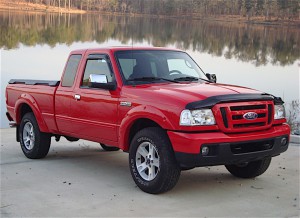In wake of the news of a 20th fatality attributed to Takata’s faulty airbags, Ford and Mazda announced they are recalling more than 380,000 older small pickup trucks for a second time to replace Takata airbag inflators.
The recalls cover driver- and passenger-side inflators in certain 2004 to 2006 Ford Ranger and Mazda B-Series trucks made by Ford. The vehicles were recalled in 2015 and 2016 to replace the inflators with newer versions, but the fix was only temporary.
Now the new inflators no longer use ammonium nitrate, which becomes unstable over time under certain conditions, and are replacing the temporary models which still used the compound.
Takata uses ammonium nitrate to create a small explosion that inflates air bags. However, over time, the chemicals can become unstable making the force of the explosion unpredictable. In the case of Takata’s airbags, the inflators would explode with such force that pieces of plastic and metal were hurled into the vehicle’s cabin.
(Faulty Takata airbag claims 20th victim. For the story, Click Here.)
The result was the aforementioned 20 deaths, the most recent being in Baton Rouge, Louisiana, in July and more than 180 injuries around the world. It spurred the largest recall in automotive history with more than 42 million vehicles and more than 69 million airbags affected.
Truck owners will be notified later this month about bringing their vehicles for the free repair. Nearly all automakers have used at least some of the faulty bags, from niche players like Rolls-Royce and Ferrari to major manufacturers such as General Motors, Volkswagen and Honda. It has been estimated that a quarter of the light duty vehicles in use in the U.S. use Takata airbags.
(To see more about the sale of Takata to Key Safety Systems, Click Here.)
Takata ended up filing bankruptcy as a result of the airbag problem. Michigan-based supplier Key Safety Systems scooped up the assets not related to the airbag business out of bankruptcy for $1.6 billion earlier this year.

